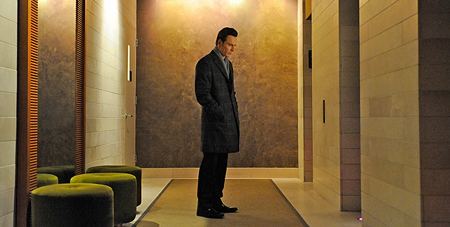Drive
Director: Nicolas Winding Refn, Screenwriter: Hossein Amini
Cast: Ryan Gosling, Carey Mulligan, Bryan Cranston, Albert Brooks, Ron Perlman
Year: 2011
My Grade: A
Director: Nicolas Winding Refn, Screenwriter: Hossein Amini
Cast: Ryan Gosling, Carey Mulligan, Bryan Cranston, Albert Brooks, Ron Perlman
Year: 2011
My Grade: A
Few people will argue if you call Gosling one of the best actors of his generation. He’s proved himself in films as varied as Half Nelson, The Believer, Lars and the Real Girl and Blue Valentine. But not every great actor is necessarily a movie star. Gosling, though, was always destined to be a superstar since The Notebook. Earlier this year, he forayed into mainstream Hollywood films with Crazy, Stupid, Love, too. In Drive, he finally gets that iconic role we were waiting for him to get. Front and centre, exuding coolness and kicking ass! This might not be his best performance – some of his past work is really hard to top – but it’s possibly his most memorable. He’s now gained every right to sing “I’m Martin Sheen. I’m Steve McQueen. I’m Jimmy Dean.”
Style
At the risk of broadly generalizing the merits of this film, I’ll say that I think its best quality is being stylish. Not since No Country for Old Men has there been a film where the director’s fingerprints could be seen on virtually every frame. And I say that as the highest compliment. From the cursive hot pink titles, to the dimly lit streets of Los Angeles, to Ryan Gosling’s already iconic scorpion jacket, to the elevator, everything is meticulously constructed and put together with surgical precision. The glossy sheen of the night and the sun-kissed surfaces of the day are absolute marvels to look at. The seamless editing that allows the camera to linger enough to maximize tension and the electrifying sound mixing create a sense of suspense most thrillers can only dream of. Really, as far as technical decisions go, Refn has not made one mistake. Top that off with Cliff Martinez’ pulsating, but hypnotic score and this is easily the year’s most stylish film.
This abundance of “style” might overwhelm some, but I didn’t mind it one bit. Refn’s direction is instinctive and visionary, and for me, never gets in the way of storytelling.
For a genre film, Drive has more great performances than most. Though Gosling and Refn are the show stealers, the supporting cast is never left behind. Christina Hendricks’ role is short but its intensity is the bedrock of one of the film’s best scenes. Ron Perlman is flawless, though that’s hardly surprising to anyone who’s familiar with his career beyond the Hellboy films. Albert Brooks’ much-talked-about villain is richly layered and successfully against-type. Bryan Cranston’s performance is subtler but also self-effacingly powerful. Then there’s Carey Mulligan. Given her physique and her relative unknown status, I worried that she’d get stuck playing cute, charming, fragile girls after An Education. Then she comes and hits me with these two performances in Drive and Shame in less than a week and all those concerns are gone. Admittedly, this is not as much as a revelation as Shame, but the type of cute, charming, fragile girl she plays here is far from the one in An Education. The silent games she plays with Gosling and their exchanges of meaningful stares make this one of the rare instance in action cinema where the romantic subplot isn’t gratuitous. Thanks to Mulligan, it’s actually one of the best parts of the film.
Addressing Complaints
There are generally three types of complaints I’ve heard or read about this film: That it’s too slow, that it’s too gory or that it’s too clichéd.
I can’t really argue with the first group other than to say that I personally never felt bored by the pace of Drive. We’re used to action films that make cuts every two seconds and change the camera angles a gazillion times in every scene to excite audience. I’d blame this more on the marketing that led people to believe they were in for Fast and Furious 6, but honestly, any action film that doesn’t use shaky handheld cameras or CGI and can hold a sensational scene like Drive’s opening sequence together for minutes at a time should be welcomed with open arms.
To the second group, all I can say is “Oh, grow a pair!” I know that sounds stupid and insensitive on my part, but the outbursts of violence are the finest conclusion to the sustained lead ups and a huge relief for our heightened sense of anticipation. Besides, violence never feels incongruous and is rather authentic to the tone of the film.
As for the clichés, I’ll be honest. I noticed them and I dug ‘em. Refn takes the clichés and polishes and glosses and paints them, or even turns them on their head and gives us something we don’t expect. I don’t think what we see in Drive counts as cliché if only because of the sheer unpredictability of the film. The themes are familiar, but Refn offers us a new way of looking at them.









